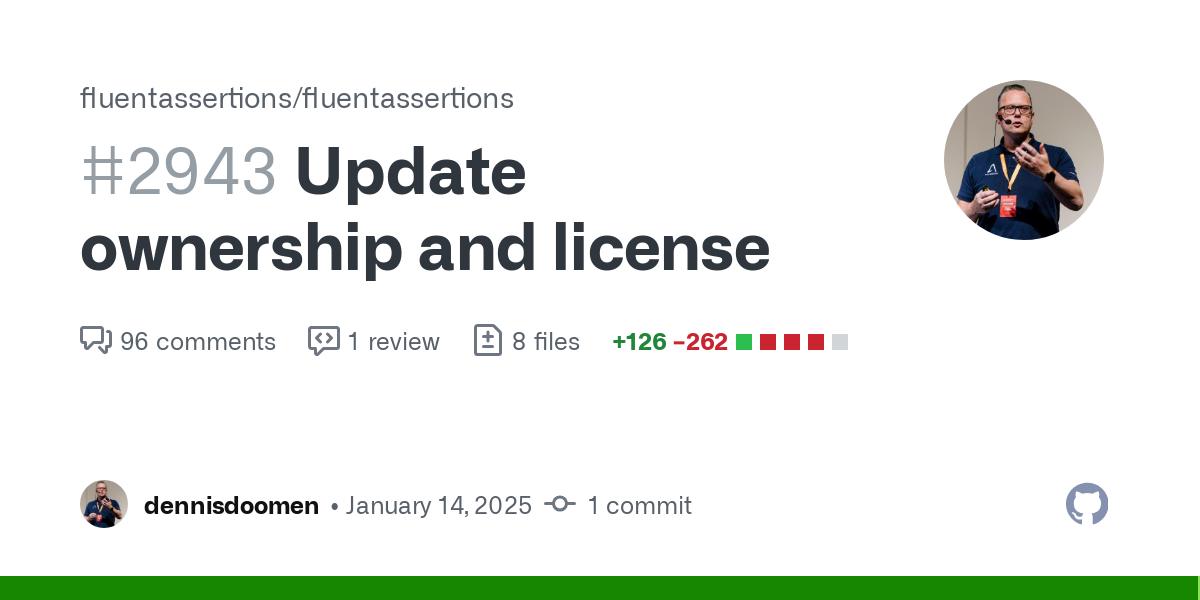This whole thing is just a nice reminder to not go overboard and use a 3rd party library when it’s completely unnecessary. I never had a need to use sth like fluent validations when you can do pretty much the same thing by writing the validation method directly in your Dto, it’s a bit verbose but at least it also lets you have more control over the whole thing. Maybe I just never used it on a scale enough to justify the library but it seems completely superfluous, dunno
it’s not data validation like you’d put in a dto, it’s an assertion library for unit tests and such. It’s mostly just sugar that makes chaining together assertions more concise with better autocomplete you get from fluent apis. You can do the same thing with built in Assert but it’s nowhere near as nice to use
Ohh I mixed it up with FluentValidations, you are right. I never liked unit tests depending on libraries like that either tbf, vanilla xunit aint that bad either
Every discussion I’ve seen about this so far has been so negative.
I hope Lemmy with its very left wing audience might have a more compassionate approach around the desire for open source developers to be compensated for their work.
Or at the very least that companies profiting from open source work start to pay back to those contributors
The issue here is that it’s just a library that makes testing assertions a little nicer. It’s not some super important library that developers get huge productivity gains with.
The author has sold the rights to the project to a commercial entity - Xceed who’s now selling it for $130 per dev - $130 for a library that just makes your unit tests assertions a little nicer! It’s an insane price, I have no idea how they’ve come up with that. That’s IDE licence territory.
A part of me is starting to think that this is actually a stunt to raise brand awareness of Xceed more than anything else.
It feels more like a quick way to make some money from companies who will begrungingly pay until they can phase out the library (which can take time). No goodwill can be gained from such a sudden rug pull.
You can pin to version 7 to prevent upgrading to version 8. Should be fine to do that and also move to something like Shouldly if devs want to keep using something like this.
It’s not a rug pull. All previous versions are still available for people to use free of charge under the previous license.
Companies using the library have a choice:
- Continue using the previous versions under the existing license
- Have their developers remove the library from all their projects (which will cost them far more than $130)
- Just accept that things cost money and pay $130 per year per developer and forget about it.
I kind of disagree that $130 is a lot of money.
As developers we should value our time and I don’t think it’s unreasonable to charge $130 for an hour of a .NET developers time, therefore I personally don’t have an issue with paying $130 per year for a tool that has proven itself useful.
While I’ve never used it myself I am aware of it and looking at if this stat (https://github.com/fluentassertions/fluentassertions/network/dependents) is to believed then there are well over 100,000 projects on GitHub alone all of whom have benefit from the author’s free labour.
I really think we need to see a revolution in how open source projects are funded. Personally, I’d love to transition to a career developing open source tools but I can’t justify it because whether you charge $1 or $130 people will always complain.
That’s IDE licence territory.
I know what you mean but I also think we’re very fortunate for the value for money we get from IDEs.
I get what you’re saying, but it’s $130 per dev for just effectively doing this:
Assert.Equal(2025, year)into
year.Should().Be(2025)It’s just not worth it at all. Don’t forget that this is per dev, so a 100 dev team is looking at a $13,000 bill just to use this package. Now imagine if every other package required a sum equal or much bigger than this?
I don’t disagree for popular open source projects charging for commercial use, but the price has to be sensible. Even just $0.20/dev would probably yield a decent income.
I do agree that per dev is such a weird way to do licensing. I have no idea how you would possibly police it. But I guess per dev is the simplest mechanism to ensure large corporations pay more than one man bands.
Even just $0.20/dev would probably yield a decent income.
My understanding has always been that just getting a billing department to pay a bill is the main barrier so whether it’s 20 cents or 120 dollars they’ll be just as resistant. Therefore you may as well charge them the latter.
I assume a company with a 100 strong dev team would simply negotiate a more reasonable fee so there’s no harm in asking $13k on the off chance a corporation is so flush they just pay it.
I do agree that per dev is such a weird way to do licensing.
Related - I was teaching at a school where I wanted them to get some plagiarism tool. The charge was per student. It was a newish school with a lot of growth, and another new school was still being built nearby (not being put into service for another year or two), so the school had A LOT of students (nearly 2 school’s worth), so, they couldn’t afford it. I ended up having to manually copy some of my student’s code and then Google it to see if they had copied it from anywhere (and yes, some of them had. BTW the most hilarious poor effort at trying to cheat was one who’s code not only didn’t even compile, but they hadn’t even bothered changing the Imperial measurements to Metric! Didn’t even need to Google that one - here’s your letter to parents 😂).




